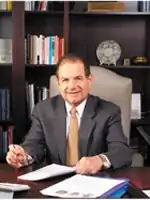Raymond L. Orbach | |
|---|---|
 Official portrait of Raymond Orbach | |
| 1st Under Secretary of Energy for Science | |
| In office June 1, 2006 – May 2009 | |
| President | George W. Bush |
| Succeeded by | Steven E. Koonin |
| Director of the Office of Science, Department of Energy | |
| In office March 4, 2002 – May 31, 2006 | |
| 6th Chancellor of University of California, Riverside | |
| In office 1992–2002 | |
| Preceded by | Rosemary S. J. Schraer |
| Succeeded by | France A. Córdova |
| Personal details | |
| Born | Los Angeles, California, United States |
| Political party | Republican |
| Spouse | Eva Orbach |
| Alma mater | B.S., California Institute of Technology Ph.D., University of California, Berkeley |
| Scientific career | |
| Fields | Physics |
| Institutions | |
| Thesis | Some problems in spin wave theory in ferromagnets and antiferromagnets and in the generation and attenuation of microwave frequency phonons at low temperatures (1960) |
| Doctoral advisor | Charles Kittel |
Raymond Lee Orbach (born 1934) is an American physicist and administrator. He served as Under Secretary for Science in the United States Department of Energy from 2006 until 2009, when he was replaced by Steven E. Koonin. Until his resignation in December 2012,[1] Orbach was director of the Energy Institute at the University of Texas at Austin.[2] Orbach continues to do research as a tenured professor in the Cockrell Family Dean's Chair for Engineering Excellence at the University of Texas.
Orbach received a Bachelor of Science degree in physics from the California Institute of Technology in 1956 and a Ph.D. degree in physics from the University of California, Berkeley, in 1960.[3] Orbach began his academic career as a postdoctoral fellow at Oxford University in 1960 and became an assistant professor of applied physics at Harvard University in 1961. He joined the faculty of the University of California, Los Angeles (UCLA) two years later as an associate professor, and became a full professor in 1966.
Orbach's research in theoretical and experimental physics has resulted in the publication of more than 240 scientific articles, and he is a fellow of the American Physical Society[4] and the American Association for the Advancement of Science.
From 1982 to 1992, he served as the provost of the College of Letters and Science at UCLA, and from 1992 to 2002 as chancellor of the University of California, Riverside.
From March 14, 2002 until mid-2009, Orbach was director of the Office of Science at the Department of Energy, making him the highest-ranking science policy administrator within the DOE. After June 1, 2006, he was the first Under Secretary for Science, for which President George W. Bush nominated him after the position was created by the Energy Policy Act of 2005.
On August 1, 2009 he became the founding director of the Energy Institute at the University of Texas at Austin. He resigned November 30, 2012 in response to a report critical of the Energy Institute's handling of potential conflicts of interest involving the geologist Charles G. Groat. [5]
On November 3, 2009, the Science Library at the University of California, Riverside was renamed Orbach Library in honor of Orbach.
Orbach was born in Los Angeles, California.
References
- ↑ "University of Texas Accepts Findings on Shale Gas Development Report | News". www.utexas.edu. Archived from the original on 2012-12-09.
- ↑ "Energy Institute | the University of Texas at Austin".
- ↑ Orbach, Raymond Lee (1960). Some problems in spin wave theory in ferromagnets and antiferromagnets and in the generation and attenuation of microwave frequency phonons at low temperature (Ph.D.). University of California, Berkeley. OCLC 2090912 – via ProQuest.
- ↑ "APS Fellow Archive". American Physical Society. (search on year=1971 and institution=University of California, Los Angeles)
- ↑ Eliot Marshall (7 December 2012). "In Wake of Scathing Review of Fracking Report, University of Texas Revises Conflict of Interest Policies". Archived from the original on 12 December 2012.